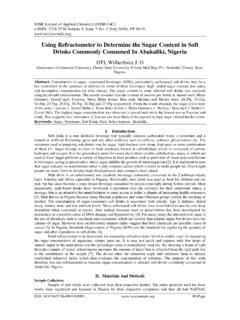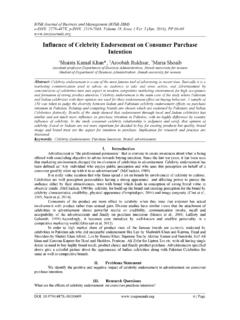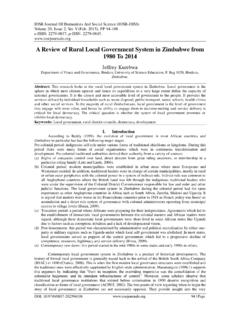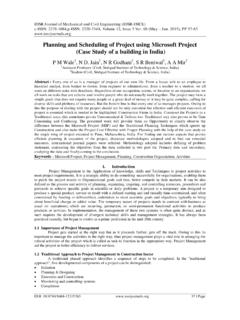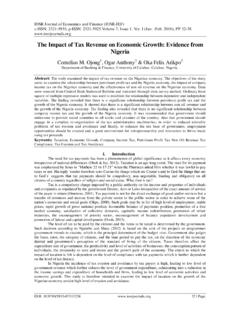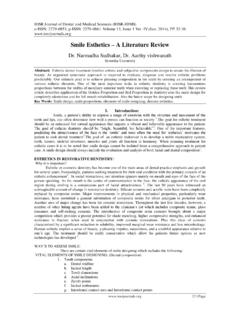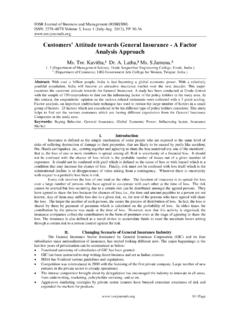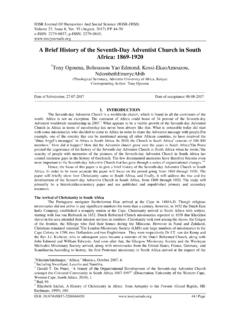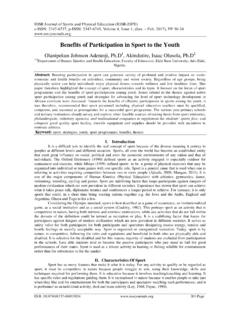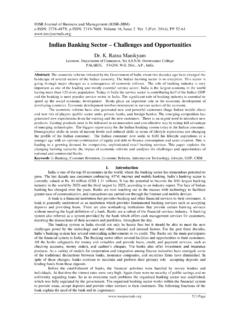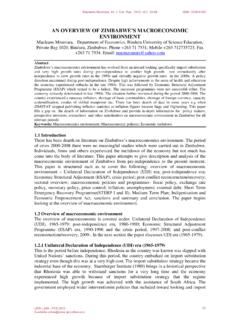Transcription of Corporate board failure in Zimbabwe: Have non executive ...
1 IOSR Journal of Business and Management (IOSR-JBM) e-ISSN: 2278-487X, p-ISSN: 2319-7668. Volume 16, Issue 7. Ver. III (July. 2014), PP 78-86 78 | Page Corporate board failure in Zimbabwe: Have non executive directors gone to sleep? 1 Sifile Obert, 2 Professor Susela Devi K. Suppiah, 3 Mabvure Joseph Tendai, 4 Chavunduka M. Desderio, 5 Dandira Martin, 1,3,4,5 Chinhoyi University of Technology 2 Unitar International University Abstract: Manuscript Type: Review Research Question / Issue: The review focuses on board failure especially in the developing world, and in particular, Zimbabwe.
2 The review asks pertinent questions: Why are boards failing? How are boards populated? What are the characteristics that determine selection to the board ? Who selects directors? Research Findings / Insights: The review establishes that there is need for a Corporate governance code and awareness of Corporate governance practices in Zimbabwe. Directors are usually selected through the influence of the CEO and such directors have weak oversight on the performance of the CEO. Some characteristics that determine director selection are gender, age, educational qualifications, experience and financial expertise.
3 Theoretical / Academic Implications: Directors are stewards who have to be accountable to all stakeholders. Practitioner / Policy Implications: There is need to establish how directors are selected in light of the high rate of company and board failures. That directors are also chosen by the CEO is worrying. The selection process should yield capable, independent and diverse directors who can satisfy the expectations of a wide spectrum of stakeholders. Key words: Corporate Governance, board , Directors, Director Selection, Zimbabwe. I. Introduction That board efficacy has been exposed by the collapse of iconic Corporate giants that were the envy of investors and competitors, is not debatable.
4 The board of directors is the epitome of Corporate governance. Firm survival hinges on an effective board with effective and controlling functions (Cadbury, 1992). While the Western and Eastern countries are far advanced in terms of the development and implementation of Corporate governance codes, Africa is lagging far behind (Rossouw, 2005). Zimbabwe does not have a Corporate governance code (at the time of publishing this article). zimbabwean companies use the Companies Act Chapter 24:03 and some provisions of codes like the South African Corporate Governance Code also called the King Report.
5 The historical and iconic Cadbury Code and its successors, the UK Combined Code on Corporate Governance are also a source of Corporate governance prescriptions that are used by zimbabwean companies. Background of the research study A plethora of local, regional and international company collapses, judicial management, fraud and corruption are ills that have characterised the Corporate landscape. The ensuing sections chronicle Corporate failures that show board failure as the guarantor of good Corporate governance. The paradox is that sometimes companies that looked very healthy would collapse without any hint that they were facing difficulties (Heenetigala and Armstrong, 2009).
6 Of historical significance are world renowned companies like Enron, WorldCom and Lehman Brothers (Blancheton et al, 2011, Jeter, 2003). Questions can be asked: Where were boards when companies were collapsing? What kind of directors populated those boards? Were the directors aware of their duties? Corporate failures in Zimbabwe Several companies have faced difficulties associated with board failure . Of note are companies like Air Zimbabwe, PSMAS, ZBC, African Renaissance Bank (AFRE), BCCI, UMB Bank, ENG Capital and Barbican Bank.
7 The major causes of Corporate scandals were centred on poor oversight and lack of proper monitoring of the CEO and executive directors by the board leading to Corporate governance breaches. While board structures were in place in the organisations, the board of directors had the biggest share of the blame for its failure to monitor management. Due to the widespread and the seemingly never ending spectre of scandals, the zimbabwean Government notes with concern the plethora of scandals and company failures bedevilling the country and Corporate board failure in Zimbabwe: Have non executive directors gone to sleep?
8 79 | Page affecting the people and the economy at large. This has led to the proposal to form a parliamentary committee to deal with corruption, scandals and misdemeanours perpetrated by those in fiduciary positions (see The Herald of 3 March of 2014). To buttress efforts by government, the Institute of Chartered secretaries and Administrators in Zimbabwe (ICSAZ) has started promoting good Corporate governance by hosting Corporate governance awards called Excellence in Corporate Governance Award and The Chartered Secretary of the Year award.
9 These efforts seek to promote Corporate governance and effective board practices in Zimbabwe. II. Literature Review Corporate governance landscape in Zimbabwe Governance issues are not alien to Zimbabwe as traditional chiefs have been recognised as custodians and fountains of knowledge of grassroots democracy as they make consultations with their council machinery or court system before taking any decision (Makahamadze, Grand and Tavuyanago, 2009). Pre-colonial chiefs were custodians of peace and human rights. Human life was viewed as sacred and annoyance of innocent people would evoke punishment from the ancestors (ibid).
10 The end result was equitable distribution of resources, justice and harmony. Chiefs have played a significant governance role since time immemorial. The chief (mambo or ishe) rules with the aid of his headmen (vanaSadunhu). He has a team of experts (makurukota) who are fountains of knowledge in various areas of life. The chief s court (dare) is like the board and the chief performs the role of chairman of the dare. The sadunhu and makurukota, who assist the chief in adjudicating cases at the chief s court, are the directors.
